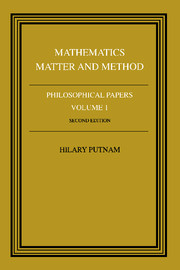Book contents
- Frontmatter
- Contents
- Dedication
- Introduction
- 1 Truth and necessity in mathematics
- 2 The thesis that mathematics is logic
- 3 Mathematics without foundations
- 4 What is mathematical truth?
- 5 Philosophy of physics
- 6 An examination of Grünbaum's philosophy of geometry
- 7 A philosopher looks at quantum mechanics
- 8 Discussion: comments on comments on comments: a reply to Margenau and Wigner
- 9 Three-valued logic
- 10 The logic of quantum mechanics
- 11 Time and physical geometry
- 12 Memo on ‘conventionalism’
- 13 What theories are not
- 14 Craig's theorem
- 15 It ain't necessarily so
- 16 The ‘corroboration’ of theories
- 17 ‘Degree of confirmation’ and inductive logic
- 18 Probability and confirmation
- 19 On properties
- 20 Philosophy of Logic
- Bibliography
- Index
15 - It ain't necessarily so
Published online by Cambridge University Press: 04 August 2010
- Frontmatter
- Contents
- Dedication
- Introduction
- 1 Truth and necessity in mathematics
- 2 The thesis that mathematics is logic
- 3 Mathematics without foundations
- 4 What is mathematical truth?
- 5 Philosophy of physics
- 6 An examination of Grünbaum's philosophy of geometry
- 7 A philosopher looks at quantum mechanics
- 8 Discussion: comments on comments on comments: a reply to Margenau and Wigner
- 9 Three-valued logic
- 10 The logic of quantum mechanics
- 11 Time and physical geometry
- 12 Memo on ‘conventionalism’
- 13 What theories are not
- 14 Craig's theorem
- 15 It ain't necessarily so
- 16 The ‘corroboration’ of theories
- 17 ‘Degree of confirmation’ and inductive logic
- 18 Probability and confirmation
- 19 On properties
- 20 Philosophy of Logic
- Bibliography
- Index
Summary
The two statements that Donnellan considered in his paper (Donnellan, 1962) are both more or less analytic in character. By that I mean that they are the sort of statement that most people would consider to be true by definition, if they considered them to be necessary truths at all. One might quarrel about whether ‘all whales are mammals’ is a necessary truth at all. But if one considers it to be a necessary truth, then one would consider it to be true by definition. And, similarly, most people would say that ‘all cats are animals’ is true by definition, notwithstanding the fact that they would be hard put to answer the question, ‘true by what definition?’
I like what Donnellan had to say about these statements, and I liked especially the remark that occurs toward the end of his paper, that there are situations in which we are confronted by a question about how to talk, but in which it is not possible to describe one of the available decisions as deciding to retain our old way of talking (or ‘not to change the meaning’) and the other as deciding to adopt a ‘new’ way of talking (or to ‘change the meaning’).
In this paper I want to concentrate mostly on statements that look necessary, but that are not analytic; on ‘synthetic necessary truths’, so to speak. This is not to say that there are not serious problems connected with analyticity.
- Type
- Chapter
- Information
- Mathematics, Matter and MethodPhilosophical Papers, pp. 237 - 249Publisher: Cambridge University PressPrint publication year: 1979
- 16
- Cited by



